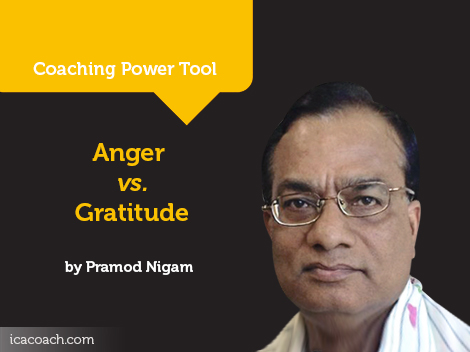
A Coaching Power Tool created by Promod Nigam
(Executive Coach, INDIA)
Our thanks to ICA student Pramod Nigam for sharing this excerpt from her power tool!
What is Anger?
Anger is an emotion related to one’s psychological interpretation of having been offended, wronged or denied and a tendency to react through retaliation. Anger can have many physical and mental consequences. The external expression of anger can be found in facial expressions, body language, physiological responses, and at times in public acts of aggression. Uncontrolled anger can, however, negatively affect personal or social well-being
What is Gratitude?
Gratitude, thankfulness, gratefulness, or appreciation is a feeling or attitude in acknowledgment of a benefit that one has received or will receive. The experience of gratitude has historically been a focus of several world religions, and has been considered extensively by moral philosophers such as Adam Smith. The systematic study of gratitude within psychology only began around the year 2000, possibly because psychology has traditionally been focused more on understanding distress rather than understanding positive emotions. However, with the advent of the positive psychology movement, gratitude has become a mainstream focus of psychological research.
Anger & Gratitude
It is difficult for anger and gratitude to reside in the same heart. Practically speaking, the two are opposites. Gratitude is both a sentiment and a manifestation. Anger, on the other hand, is its own sentiment and manifestation.
Gratitude and anger are to each other as water and fire. Anger is like fire in that it is something that feeds off itself and any flammable resources. It spreads and spreads. It is dissipated only by way of removing the air or flammable materials. It is extinguished by water. Gratitude is like water in that it nourishes, lubricates, and cools the person. And, gratitude extinguishes anger. It takes much more anger to evaporate the water of gratitude than the reverse.
There are many instances, in our day to day life and at workplaces, where we have been angry and shown some sort of resentment, but when we introspect and reflect on the same over a period of time, we believe our anger was not justified, but instead it helped us with an opportunity to grow. This happens in relationship with our parent, teachers, bosses, peers, etc.
One of the classical examples could be based on our appraisals with our bosses – we may have been angry with certain comments or weaknesses highlighted, but taking it positively and working diligently on these areas over a period of time, we were able to convert these drawbacks into our strengths. And, then we realize that we owe our current status to some of the feedback from our past bosses!
What should we do when faced with hurt, anger or disappointment? We can choose to react differently by talking responsibility for your own emotions and feelings. We do this in full awareness that others do not ‘cause ‘your feelings’ – you choose your own.
Lets us introspect – think of two people who have hurt us, made us angry or let us down recently – now ask ourselves – what is my anger doing to me? Do I feel happy holding on to it? Does it make me feel happier? Does it improve my sleep? Is my life better, richer, more meaningful because of my resentment? Is the answer to all the above questions is “ NO” then let’s take a courageous decision to move forward.
Reflections
References
Invite A Moment of Calm – JP Vaswani, An article in “The Speaking Tree” from The Times Of India